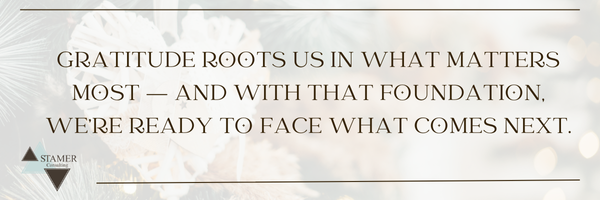The Power of Gratitude — Turning Holiday Thankfulness into Career Connections
Every year tells a story — moments of joy, challenge, and unexpected growth. As the holidays slow our pace, gratitude invites us to pause and look back before moving forward.
This first reflection begins with appreciation — recognizing the people, lessons, and experiences that shaped our path. Gratitude grounds us, connecting heart and purpose, and prepares us to face what comes next: the courage to embrace change.
As the days grow shorter and the year begins to wind down, the world seems to exhale. The pace slows, inboxes quiet, and conversations drift toward family plans, travel, and reflection. The holidays often invite us to take stock — not just of what we’ve accomplished, but of who helped us along the way.
It’s easy to overlook the quiet supporters: the colleague who gave timely advice, the manager who took a chance on you, the client who trusted your expertise. Gratitude gives those moments shape — and in doing so, opens a powerful channel for genuine connection.
In a world that glorifies productivity and “networking,” gratitude feels almost radical. Yet research consistently shows it’s one of the most transformative habits for both personal well-being and professional success. Psychologists Robert Emmons and Michael McCullough (2003) found that people who regularly express gratitude experience higher levels of happiness, optimism, and social connection. In the workplace, that translates into stronger collaboration, greater trust, and deeper influence.
Gratitude Is More Than a Feeling — It’s a Leadership Skill
When we think of leadership development, we often think of strategy, communication, or decision-making. But gratitude is the quiet competency that amplifies them all. It fuels empathy, deepens self-awareness, and helps others feel seen.
Leaders who intentionally express appreciation foster higher engagement and psychological safety among their teams (Boyatzis & Jack, 2020). Think about the leaders you’ve respected most — chances are, they not only recognized achievements but also the effort behind them.
The same holds true beyond the office. Gratitude strengthens our professional relationships in subtle, lasting ways. It transforms networking from a transactional act into a relational one. When you send a note that says, “I’ve been thinking about the project we worked on — your feedback truly shaped how I approach my work,” you’re not networking; you’re connecting.
How Gratitude Reframes Professional Connection
Too often, professionals approach networking as an obligation — something to “check off” before a job search or performance review. But gratitude changes the energy of outreach. Instead of asking, What can I get from this person?, it asks, What impact did they have on me — and how can I honor that?
Here are a few ways to cultivate gratitude-driven networking this season:
Send personal, specific thank-yous.
Skip the generic “Happy holidays!” email. Instead, write a few sentences about something memorable the person contributed to your professional growth.Acknowledge mentors and advocates.
Reach out to those who’ve offered you feedback, visibility, or encouragement — even if it’s been years. Gratitude is timeless; it doesn’t expire.Celebrate others publicly.
Share someone’s work on LinkedIn or write a short post highlighting their leadership or collaboration. Giving recognition publicly deepens trust privately.Give back through generosity.
Offer to mentor, share a resource, or connect someone to an opportunity. As Adam Grant (2013) found, “givers” — those who lead with contribution — ultimately build the strongest, most enduring networks.
Gratitude doesn’t just make people feel appreciated. It also reminds you of your own abundance — the web of connections and experiences that have carried you to this point.
A Moment to Reflect
Before the year closes, take ten minutes to reflect:
Who has made your work more meaningful this year?
What feedback, however small, changed your perspective?
Who deserves to hear, “You made a difference”?
Write their names down. Reach out. Say thank you.
Gratitude turns endings into beginnings. The relationships you nurture now may quietly become the doors that open in the year ahead.
Next in the series: Courage to Pivot — What the Year Taught Us About Change.
References
Boyatzis, R. E., & Jack, A. I. (2020). Coaching with compassion: Inspiring health, well-being, and sustainable change. Harvard Business Review Press.
Emmons, R. A., & McCullough, M. E. (2003). Counting blessings versus burdens: An experimental investigation of gratitude and subjective well-being in daily life. Journal of Personality and Social Psychology, 84(2), 377–389. https://doi.org/10.1037/0022-3514.84.2.377
Grant, A. (2013). Give and take: A revolutionary approach to success. Penguin Books.


